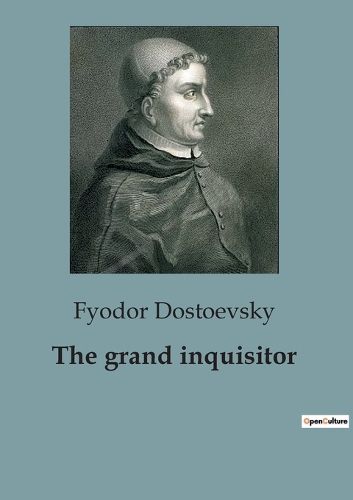Readings Newsletter
Become a Readings Member to make your shopping experience even easier.
Sign in or sign up for free!
You’re not far away from qualifying for FREE standard shipping within Australia
You’ve qualified for FREE standard shipping within Australia
The cart is loading…






"The Grand Inquisitor" is a significant and widely read chapter from Fyodor Dostoevsky's novel "The Brothers Karamazov." Dostoevsky's novel was first published in 1880. "The Grand Inquisitor" is a stand-alone section within the novel where Ivan Karamazov tells the story to his brother, Alyosha, of a Grand Inquisitor who questions and confronts Jesus Christ upon His return to Earth. In the story, the Grand Inquisitor represents the authority of the church and the state, while Jesus Christ represents spiritual and moral truth. The Grand Inquisitor's argument revolves around the idea that the church and state must control and limit individual freedom for the sake of the common people, who are not capable of handling true freedom. This section of the novel is often studied independently because it presents a thought-provoking exploration of religious, philosophical, and moral themes. Dostoevsky's work is celebrated for its deep and complex examinations of the human condition and the role of faith and morality in society. "The Grand Inquisitor" is a prime example of his ability to grapple with these profound questions.
$9.00 standard shipping within Australia
FREE standard shipping within Australia for orders over $100.00
Express & International shipping calculated at checkout
"The Grand Inquisitor" is a significant and widely read chapter from Fyodor Dostoevsky's novel "The Brothers Karamazov." Dostoevsky's novel was first published in 1880. "The Grand Inquisitor" is a stand-alone section within the novel where Ivan Karamazov tells the story to his brother, Alyosha, of a Grand Inquisitor who questions and confronts Jesus Christ upon His return to Earth. In the story, the Grand Inquisitor represents the authority of the church and the state, while Jesus Christ represents spiritual and moral truth. The Grand Inquisitor's argument revolves around the idea that the church and state must control and limit individual freedom for the sake of the common people, who are not capable of handling true freedom. This section of the novel is often studied independently because it presents a thought-provoking exploration of religious, philosophical, and moral themes. Dostoevsky's work is celebrated for its deep and complex examinations of the human condition and the role of faith and morality in society. "The Grand Inquisitor" is a prime example of his ability to grapple with these profound questions.